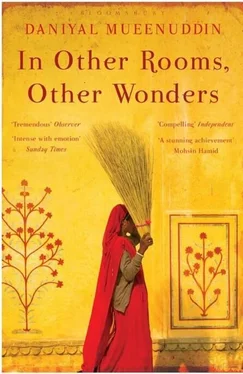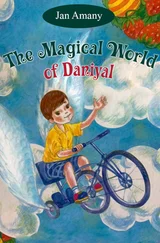Understanding this oblique reference to the fact that Chacha Latif treated her with little ceremony, as an equal, Husna sweetly replied, ‘He’s well, Uncle, thank you.’
AS SHE RODE home in the back seat of K. K.’s large if old car, looking at the back of the chauffeur’s immense head, Husna’s complex thoughts ran along several lines. Given to fits of crushing gray lassitude and then to brimming moments that approached hysteria, she had always believed she would escape the gloominess of her parents’ house. She would escape the bare concrete steps, layered with dust, leading up into rooms without windows, the walls painted bright glossy colors, as if to make up for the gloom, the television covered with an embroidered cloth. She had spoiled herself with daydreams, until her parents were afraid of her moods.
She despised them for living so much in the past, retelling the stories of their grandparents’ land and money, and yet at the same time she felt entitled to rejoin that world and felt aggrieved at being excluded from it. Taking service in an ambiguous position with Begum Harouni had been the greatest concession she ever made to her mediocre prospects, and having made this concession increased her determination to rise, although she had no idea how to go about it.
Husna knew that she could never hope to marry or attract a young man from one of the rich established families. Wearing clothes just better than those of a maidservant, she saw them from a distance at the weddings to which she accompanied Begum Harouni. At that time, in the 1980s, the old barons still dominated the government, the prime minister a huge feudal landowner. Their sons, at least the quick ones, the adapted ones, became ministers at thirty, immaculate, blowing through dull parties, making an appearance, familiar with their elders, on their way to somewhere else, to cool rooms where ice and alcohol glowed on the table, those rooms where deals were made; she imagined them gliding through foreign airports, at ease in the European cities that she read about. She would even have sought a place in the demimonde of singers and film actresses, bright and dangerous creatures from poor backgrounds, but she had neither talent nor beauty. Only determination and cunning distinguished her, invisible qualities.
The chauffeur, knowing without being told that Husna would not wish to be seen going home late at night in the old man’s car, dropped her just inside the gate of the house in fashionable Gulberg. K. K. had given this house to his wife when, finally and uncharacteristically, he made a firm decision and told her she must leave. Unable to keep Harouni’s attention, barely out of purdah, Begum Harouni had tried amulets, philters, spells — he joked to his friends that she would end up poisoning him by accident. But one day she came onto the verandah off his bedroom, where he was having tea with a lady friend and innocently playing rummy. She stood, her back humped, spitting in Punjabi, ‘Leave my house, leave my husband alone, you witch!’ And Harouni’s friend, a convent-schooled society woman who barely spoke Punjabi and had only a vague idea who this lady might be, kept asking, ‘But what’s she saying, K. K.? Should I leave?’ He had not, however, divorced his wife, having no intention of remarrying and no desire to humiliate her. Old Begum Harouni thereafter lived in a state of suspended equilibrium, hoping to be recalled to her husband’s side.
Husna cautiously walked up the straight, long drive, bordered with bougainvillea and jasmine. She went to the back, where the servants lay under blankets in the courtyard, and slipped through an open door, through the filthy kitchen, which smelled of garlic and curry, and into the heavily carpeted dining room. Over the fireplace, which had not been lit in years, she saw her face in a mirror. The irregularity of her features, her straight, dry hair, her small mouth, all caused her to cringe inwardly and suddenly to feel vulnerable. She felt the immensity of her encounter with K. K. Harouni. The old lady didn’t wake when Husna crept in, but just before dawn she called her, saying that she couldn’t sleep, and told the young girl to massage her legs.
Husna continued going for lessons, and thrice in the first weeks walked with K. K., who then sent her home in the car. She tried to limit these encounters, fearing that Begum Harouni would discover the growing relationship and would send her away, back to her parents.
On the days when she allowed herself to see him, Husna would stay in the office after the secretary left, gazing out of a window that overlooked the long garden where K. K. walked. She didn’t read, but sat at the desk surrounded by books in both English and Urdu, her chin resting on her hands. She did not even plan, but floated through images.
Whenever she saw a girl her age stepping from a large new car in Liberty Market, among the expensive shops, or glittering in a pair of diamond drops at a wedding, Husna’s mind would hang on these symbols of wealth, not letting go for hours. She sensed that all this might come to her through Harouni, if she became his mistress. In the Old City where she grew up, the neighborhood pointed with shaming fingers at women from less than respectable families who were kept by merchants. The eyes of these creatures glided over the crowd as they rode on tongas, emerging untouched from dark streets where sewage flowed in the drain, as prominent as targets in brightest red silk, lipstick, gold. Husna’s mother ground out remarks of the price to be paid, broken relations with family, broken old age.
The young girl’s fear of Harouni had dissipated, and she let herself be seen, critical, quick-witted, sensual, and slightly crude. Not despite but because of his sophistication, he found her manner piquant. She did not behave or speak like the women he normally met, for she had always inhabited an indefinite space, neither rich nor poor, neither servant nor begum, in a city where the very concept of a middle class still found expression only in a few households, managers of banks and of the big industrial concerns, sugar and textiles and steel. As a boy Harouni had slept with maidservants, lost his virginity to one of them at fourteen. Husna evoked those ripe first encounters.
Six weeks after Husna’s first walk with K. K., Begum Harouni announced a pilgrimage to the holy places, in order to perform the umrah . Husna decided to bring the Begum’s impending departure into the conversation that afternoon, before any guests arrived and interrupted them.
When Rafik brought his afternoon tea into the living room, K. K. could hear the typewriter clacking in the background. It stopped, and then Husna knocked. She opened the door, showing her head without entering.
‘Come in, my dear.’
Husna’s cultivation of the butler Rafik had progressed, to the point that he included an extra cup on the tea trolley. She drew herself forward and made K. K.’s tea exactly as he liked it. A boy passed a plate of biscuits, while Rafik stood back on his heels by the door.
‘When I’m here,’ said Husna, ‘everything is so nice and everyone is pleasant. These biscuits, the tea. Shah Sahib tries so hard to teach me the typing, though I can’t seem to learn.’ She held out her hands and spread the fingers in front of him, like a cat stretching. ‘My hands are so tiny, I can’t reach the keys. But then all of me is small.’
She wore a fitted kurta, showing the cleft of her breasts, which jutted out from her muscular youthful torso. Their eyes met; they both saw the joke, and he allowed himself a tight-lipped smile, his normally placid expression becoming avid and boyish.
‘That’s what I’ve been telling you about,’ Husna purred, putting her hand on his arm. ‘Your crocodile smile, the one I like.’
Читать дальше












